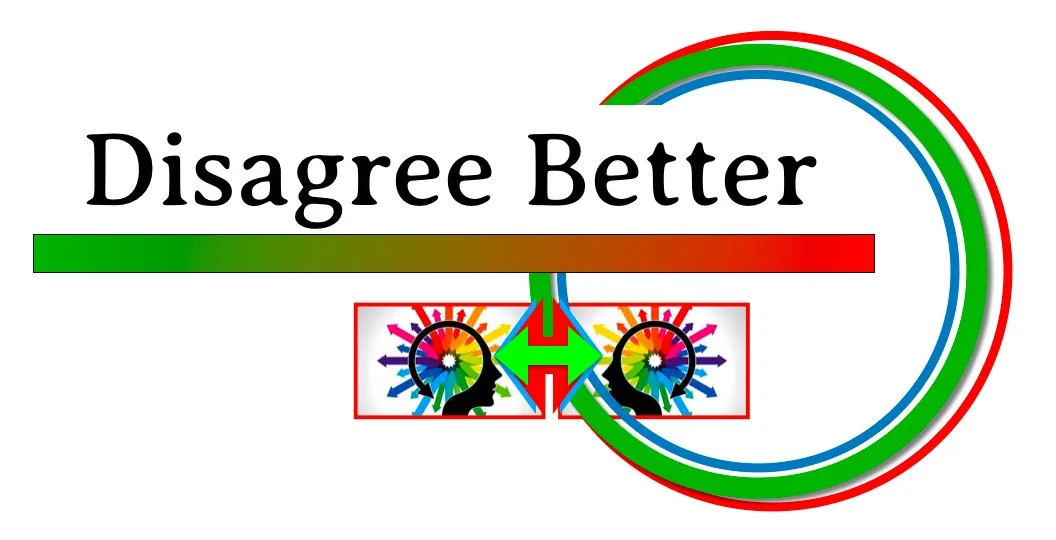Disagree Better:
10 Principles with Examples
1. Start Softly, Avoid Harsh Start-Ups
• Done Badly: “You’re so selfish! You never help around the house!”
• Explanation: Aggressive accusations create an immediate defensive response and escalate conflict.
• Impact: The partner feels attacked and shuts down, reducing the chance for a meaningful resolution.
• Done Well: “I feel overwhelmed with the housework. Can we talk about how we can share the responsibilities better?”
• Explanation: Using “I” statements focuses on personal feelings and invites collaboration.
• Impact: Sets a respectful tone, encouraging cooperation and reducing defensiveness.
2. Express Complaints, Not Criticism
• Done Badly: “You never care about me or what I need!”
•Explanation: Criticizing a partner’s character with absolutes like “never” or “always” triggers defensiveness.
•Impact: Shifts focus away from the issue and into a blame game, halting progress.
• Done Well: “I felt hurt when you didn’t ask about my big meeting. It’s important to me to feel supported in moments like that.”
•Explanation: Complaints focus on specific behaviors, allowing the partner to understand the impact without feeling attacked.
•Impact: Opens a pathway for resolution and reinforces trust through constructive dialogue.
3. Regulate Emotional Responses
• Done Badly: “I’m done talking about this!” (Partner storms out, slamming the door.)
• Explanation: Reacting impulsively without managing emotions increases tension and damages emotional safety.
• Impact: Escalates the conflict, leaving both partners feeling unheard and disconnected.
• Done Well: “I’m feeling overwhelmed. Can we take a 10-minute break to calm down and return to this?
• Explanation: Pausing allows both partners to self-regulate and prevents emotional flooding.
• Impact: Maintains safety and keeps the door open for constructive dialogue.
4. Validate Emotions, Don’t Dismiss
• Done Badly: “You’re overreacting! It’s not that big of a deal!”
• Explanation: Dismissing emotions invalidates the partner’s experience, leading to feelings of rejection.
• Impact: Amplifies disconnection and resentment, making achieving resolution more challenging.
• Done Well: “I can see this matters to you. Tell me more about what’s bothering you.”
• Explanation: Validation acknowledges the partner’s feelings, showing empathy and interest.
• Impact: Strengthens emotional trust and fosters more profound understanding.
5. Address Conflict Directly, Don’t Avoid
• Done Badly: “Let’s just drop it. It’s not worth talking about.”
• Explanation: Avoiding conflict to maintain peace leaves issues unresolved and creates emotional distance.
• Impact: Builds resentment over time and prevents necessary growth in the relationship.
• Done Well: “I know this is a hard topic, but i believe in us and we can work through it.”
• Explanation: Addressing vulnerability issues fosters trust and allows for resolution.
• Impact: Encourages open communication and emotional growth.
6. Clarify Intentions, Don’t Assume
• Done Badly: “You’re just trying to make me feel bad!”
• Explanation: Assuming harmful intentions without clarifying leads to mistrust and defensiveness.
• Impact: Escalates conflict and prevents productive communication.
• Done Well: “I’m not sure what you meant by that. Can you help me understand?”
• Explanation: Asking for clarification prevents misunderstandings and encourages mutual respect.
• Impact: Builds trust and ensures both partners feel heard and respected.
7. Balance Autonomy and Connection
• Done Badly: “We need to agree on everything, or this relationship won’t work.”
• Explanation: Over-fusion* demands alignment at the expense of individuality, creating dependence and resentment.
• Impact: Stifles personal growth and weakens the relationship dynamic.
*In over-fusion, partners may prioritize the relationship to the extent that their personal needs, desires, and interests are neglected. This can lead to issues such as resentment, loss of self, and communication difficulties, as each partner may rely too heavily on the other for emotional support and fulfillment. This can make the relationship less resilient.
• Done Well: “I respect that we see this differently. Let’s figure out a way for us to move forward.”
• Explanation: Embracing differences strengthens the partnership by respecting autonomy and fostering collaboration.
• Impact: Encourages mutual respect and strengthens the bond.
8. Break the Blame Cycle
• Done Badly: “You’re the reason we’re always fighting! You don’t care about us!”
• Explanation: Blame creates a hostile environment, triggering defensiveness and emotional withdrawal.
• Impact: Reinforces a cycle of frustration and disconnection.
• Done Well: “I miss feeling close to you. Can we talk about what’s been going on between us?”
• Explanation: Expressing vulnerability without blame invites connection and collaboration.
• Impact: Encourages responsiveness and fosters emotional intimacy.
9. Honor Agreements and Secure Functioning
• Done Badly: “I know we said we wouldn’t yell, but I’m too upset right now!”
• Explanation: Breaking commitments during conflict undermines trust and reliability.
• Impact: This creates insecurity and weakens the foundation of the relationship.
• Done Well: “We agreed not to yell, please, so let’s stick to that and take turns speaking calmly.”
• Explanation: Honoring shared agreements reinforces trust and demonstrates respect for the relationship.
• Impact: Builds safety and cooperation, allowing for productive conflict resolution.
10. Embrace Differences as Strengths
• Done Badly: “We’re too different. This just isn’t going to work.”
• Explanation: Viewing differences as obstacles create division and hopelessness.
• Impact: Erodes connection and reduces the growth potential.
• Done Well: “Our differences give us a unique perspective. Let’s see how we can use them to solve this.”
• Explanation: Reframing differences as opportunities for collaboration fosters appreciation and creativity.
• Impact: Strengthens mutual respect and reinforces the sense of partnership.
These principles, drawn from the expertise of Gottman, Johnson, Bader, Schnarch, and Tatkin, provide actionable ways to navigate disagreements constructively. By starting gently, expressing needs clearly, validating emotions, and embracing differences, couples can strengthen trust, deepen intimacy, and grow together. Constructive disagreements become an opportunity to learn, evolve, and build a stronger relationship.
——-
Don Elium, MFT 925 256-8282 Text/Phone in Northern and Southern California







